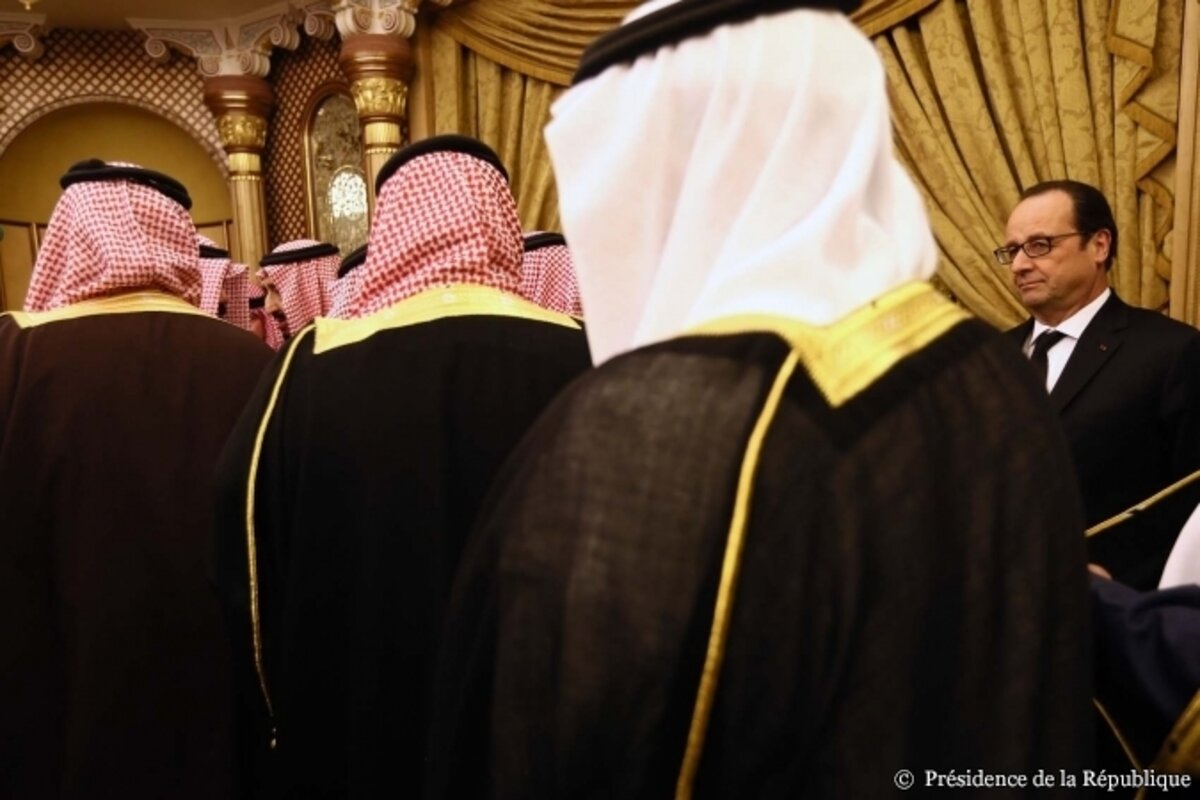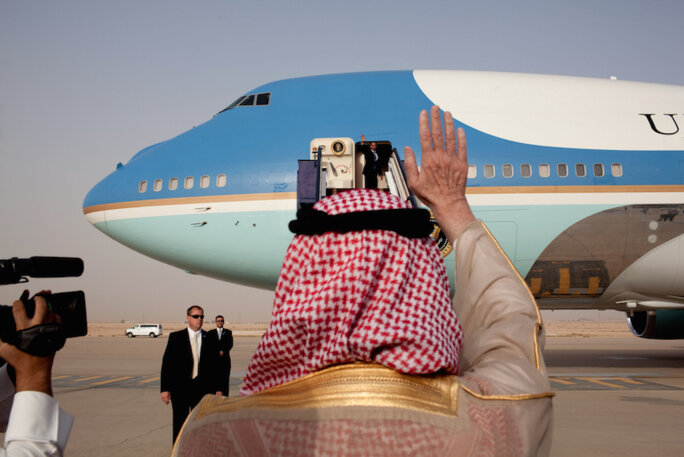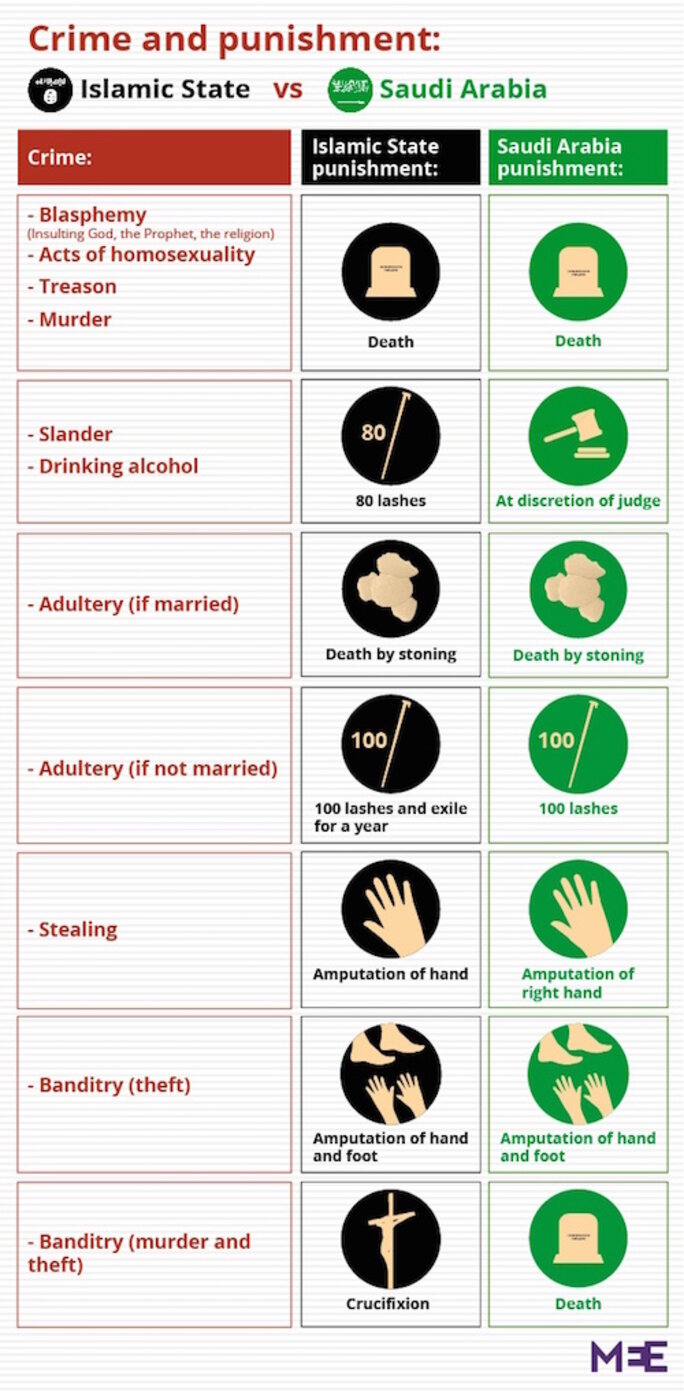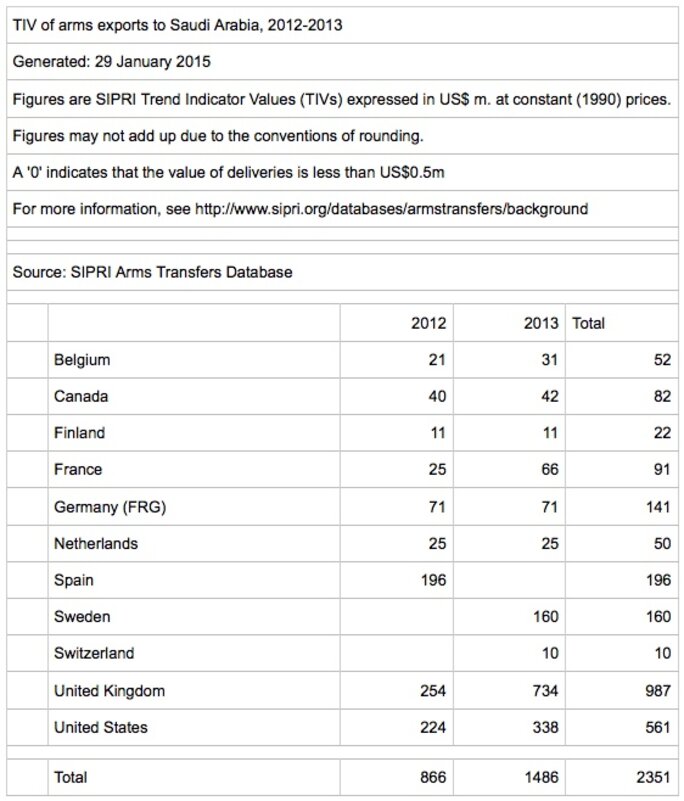The world had not seen such a parade of heads of state and government for, well, at least 15 days, since leaders had gathered in Paris following the Charlie Hebdo and Jewish supermarket murders. As for United States president Barack Obama coming to offer his condolences in person, one has to go back to the death of Nelson Mandela for the last time that happened. So who was it who merited such attention from world leaders? It was none other than the Saudi Arabian king Abdullah bin Abdulaziz Al Saud who died at the age of 90 on January 23rd, 2015.
This eagerness to come and pay tribute to an absolute monarch, master for 20 years (if king in name only for ten) of a country which is among the most repressive on the planet, as well as being a nation linked with funding terrorism, stretched diplomatic hypocrisy to levels rarely seen before. While the French president François Hollande was cautious in his public comments, saluting a statesman “whose actions profoundly shaped the history of his country and whose vision of a fair and lasting peace in the Middle East remains more relevant than ever”, others got carried away with their emotions. The former British prime minister Tony Blair, for example, described the late king as a “stable and sound ally ... a patient and skilful moderniser of his country leading it step by step into the future”. Meanwhile the head of the International Monetary Fund (IMF) Christine Lagarde spoke of a man who “was, in a discreet manner, a great defender of women”.
All those fine words and obeisance to the memory of the late king were not just about practical politics or Realpolitik; they were like tributes from a drug user to their dealer, with an obsequious nod in the direction of his successor.
Saudi Arabia is not just an oil producer, it is also a major buyer of Western goods – with weapons at the top of the list – and a partner when it comes to sharing intelligence. For those reasons, and for the sake of the stability of the Saudi kingdom, the rest of the world closes its eyes to one of the worst records on earth on issues of freedom, democracy and human rights. The case of blogger Raif Badawi, which has received lots of attention after he was sentenced to ten years in jail and 1,000 lashes for having expressed his views online, is but one of many such examples in a country that is profoundly totalitarian and harmful on the world stage.

Enlargement : Illustration 1

To get an idea of just how bad things are in the kingdom one only has to read a report on it published by Amnesty International in October 2013, which provides a brief summary of the failure of the authorities there to act on their promises to improve human rights. “Torture and other ill-treatment during detention and interrogation are common and carried out with impunity,” the reports says. “Some of the commonly practised methods include punching, beating with sticks, suspension from the ceiling or cell doors by the ankles or wrists, application of electric shocks to the body, prolonged sleep deprivation and being placed in cold cells.”
According to the report, other human rights violations practices by the regime include (among others):
- “Women continue to face severe discrimination in law and practice ... women are required to obtain the permission of a male guardian before getting married, travelling, undergoing certain surgical interventions, undertaking paid employment or enrolling in higher education. ... Women also continue to be prohibited from driving.
- “Saudi Arabia has one of the highest execution rates in the world ... Defendants may be convicted solely on the basis of “confessions” obtained under torture or other ill-treatment, duress or deception... The authorities apply the death penalty to a wide range of non-lethal crimes that are not accepted as “most serious crimes” under international standards for applying the death penalty. These include adultery, armed robbery, apostasy, drug smuggling, kidnapping, rape, “witchcraft”and “sorcery”.
- “Torture and other cruel, inhuman or degrading treatment or punishment. Corporal punishment is used extensively in Saudi Arabia. Flogging is mandatory for a number of offences and can also be imposed at the discretion of judges as an alternative or in addition to other punishments. Sentences can range from dozens to tens of thousands of lashes, and are usually carried out in instalments, at intervals ranging from two weeks to one month. … Punishment by amputation is also enforced in Saudi Arabia for certain offences, including “theft”, for which the sentence is amputation of the right hand, and “highway robbery”, which is punished by “cross amputation” (amputation of the right hand and left foot).”
'Many terrorist groups are still funded in Saudi Arabia'
For countries such as France and the United States, which boast about defending and promoting human rights, having close relations with a country carrying out such practices is, to say the least, disturbing. But when one also proclaims that terrorism is now the biggest threat faced by the planet, there is a real paradox about being an ally of Saudi Arabia. As Ed Hussain of the influential US think tank the Council on Foreign Relations never tires of pointing out: “Al Qaeda, the Islamic State in Iraq and Syria, Boko Haram, the Shabab and others are all violent Sunni Salafi groupings. For five decades, Saudi Arabia has been the official sponsor of Sunni Salafism across the globe.”
It is also worth recalling that Osama bin Laden was a Saudi and that his family fortune came from contracts negotiated by his father for the construction and maintenance of mosques in the kingdom. Fifteen of the 19 terrorists who flew their planes into the World Trade Centre and the Pentagon in 2001 were Saudis, as were a number of their accomplices. Yet it was not Saudi Arabia that was bombarded or invaded after 9/11 but Afghanistan and Iraq.

Enlargement : Illustration 2

As several current and former elected US representatives pointed out in early January 2015, 28 pages of the congressional inquiry into the 9/11 attacks are still classified and have not been made available to the public. According to those who have had access to them, these pages concern Saudi Arabia. “There are a lot of rocks out there that have been purposefully tamped down that, if they were turned over, would give us a more expansive view of the Saudi role [in assisting the 98/11 hijackers],” former Democrat senator Bob Graham told Newsweek. Speaking to the same publication, Republican congressman Walter Jones, who has also read the classified pages, said: “There is no reason the 28 pages have not been made public. It’s not a national security issue.” Parts of it, however, Jones said, will be “somewhat embarrassing for the Bush administration,” because of “certain relationships with the Saudis.”
The White House under President Bush was always opposed to the publication of those sensitive 28 pages on Saudi links to the terror attacks; to give an idea of how close links were between certain members of the two countries, the Saudi ambassador to the US at the time, Prince Bandar bin Sultan, was nicknamed 'Bandar Bush'. But the White House under Barack Obama has been just as determined not to see those pages made public.

Enlargement : Illustration 3

A number of diplomas and world leaders claim that the role played by the Saudis before 9/11 is now all in the past, and that the kingdom had cleared out its secret services – which had many links with Al Qaeda – and put in control mechanisms to stop terrorist groups being financed by wealthy Saudi families. But at least one European diplomat, who served in the Persian Gulf in the 2000s, says the situation is not as clear-cut as that. “Many terrorists groups are still financed in Saudi Arabia. Of course the link is not direct, but rich Saudis continue to give to causes or to intermediaries, who in their turn pass it on to other intermediaries by the hawala system. When they are confronted about the issue, they generally reply something along the lines of: 'But it is part of the commandments of Islam to give money!' The reality is that lots of Saudis don't see a problem in funding groups that call for Wahhabism [editor's note, an ultraconservative movement within Islam popular inside Saudi Arabia] or who claim to fight in the name of the Prophet.”
Moreover, what is the real difference between the 'Saudi model' and the kind of regime promised by Islamic State or Boko Haram? The reality is: not much. The Middle East Eye website carried out an illuminating comparison (see diagram above) of the types of sentences inflicted for various crimes in Saudi Arabia and under Islamic State. There is almost no difference. The sentences, the edicts, and the Koranic interpretation of Saudi imams remain models for all such terrorist groups in the world. And these imams and their religious associations remain mostly financed by Saudi government princes.
In 2007 a Jordanian diplomat described the relationship between Saudi Arabia and the United States as a “Catholic marriage in which there can be no divorce”. In fact, it might be better to look at it as a taking of hostages. Saudi Arabia exercises a form of blackmail through its cooperation over terrorism and stability in the Middle East, letting it be known that things would be even worse without its help. Yet it is clear today that it is precisely the actions of the Saudi kingdom that are throwing fuel on the fire.
The same blackmail exists when it comes to oil, with the Americans the main target. Although in recent years the United States has been on the way to attaining energy independence through developing its shale gas reserves, thanks to high oil prices that made such development economic, and that, as a result, their foreign policy was becoming less dependent on the Persian Gulf, the major fall in oil prices over the last six months has changed the situation.
One of the more perverse outcomes is that this Saudi policy of keeping oil prices low has helped the Americans in the short term. Not only has Barack Obama received an economic boost – the price of petrol had halved at the pumps - which has been reflected by an upturn in his opinion poll ratings. But the low prices have also helped the US's tough policy with Russia and Iran, two countries really suffering from the low yield on their gas and oil reserves. The Americans remain caught in the grip of the Saudis who are still the main arbiter of the price of oil.
'Our regional policy is a victim of our short-term thinking'
As for France, it runs after Saudi Arabia in the hope of selling ever more goods – especially weapons - to the oil-rich kingdom. Nicolas Sarkozy had put an emphasis on Qatar in the hope of securing some major political victories. As for François Hollande, he chose to do business with the Saudis. A quick glance at the history of bilateral visits between the two countries shows the frenzied activity of the president's team that has occurred following his election in 2012: out of the 39 bilateral visits that have occurred since Abdulaziz ibn Abdul Rahman Al Saud founded the modern Saudi Arabia in 1926, 15 took place between November 2012 and the end of 2014. The French president honoured the kingdom with two state visits, in 2012 and 2013, adding a third on January 24th, 2015, following the announcement of King Abdullah's death.
France has not lavished such attention on any other state. The majority of ministers who have gone to Saudi have been those with an economic brief; the former minister of productive recovery, Arnaud Montebourg, went to Riyadh four times in 2013. The defence minister Jean-Yves Le Drian also went three times in the same year.
At the heart of this economic diplomacy has been arms, and more specifically two sectors in which France excels: anti-aircraft defences and the navy. And after so many visits the benefits have finally begun to flow, in the form of a three-billion-euro framework agreement signed on November 4th, 2014, by the Saudi ministry of finances and Edouard Guillaud, the chief executive of public-private French firm ODAS, the body charged with looking after arms contracts between France and Saudi Arabia. The agreement will benefit more than 20 French companies, who will share 2.1 billion dollars. The weapons themselves will in fact go the Lebanon, as will the remaining 900 million dollars for the maintenance and training of Lebanese forces. The deal in effect represents a gift from Saudi Arabia to the Lebanon, as the latter battles to contain the growing jihadist problem on its border with Syria.
Before it signed this lucrative deal, France had already tripled its arms sales between 2012 and 2013. Below is a graphic from the Stockholm International Peace Research Institute (SIPRI) showing the arms that Saudi Arabia imports from various countries:

Enlargement : Illustration 4

The French presidency's logic is easy to follow. According to a ministry of defence study carried out with the defence industries council (CIDEF) and private consultancy firm McKinsey, defence exports reached 6.87 billion dollars in 2013, a 43% increase on 2012. Defence sector exports represent around 40,000 jobs. And Saudi Arabia became by far the biggest client for France in 2014, worth 1.928 billion euros in contracts, according to a report by the French Parliament on sales exports.
In addition to the unfortunate message this sends out, given the human rights abuses in the kingdom, this form of political courtship also drives France into supporting decisions made in Riyadh; in effect it has sub-contracted out French foreign policy. “Our hands are tied, and our regional policy is a victim of our short-term thinking: France is in the position of a supplicant when it comes to Saudi Arabia,” says Marc Cher-Leparrain, a former diplomat in the region who is very familiar with the issue of arms sales to the Gulf States.
With the French weapons they have just agreed to buy, Saudi hopes that it can one day intervene more directly in the Lebanon to counter Hezbollah and stop it from supporting the Bashar al-Assad regime in Syria. Having no presence in Syria, France is in effect delegating its Syrian policy on the ground to Saudi Arabia.
Since 2011 Saudi Arabia has been a key player in supporting the regime in Egypt, where a political process has led to the re-establishment of a dictatorship under Abdel Fattah al-Sisi. It is hard to see the warm greeting accorded to al-Sisi by President Hollande during his visit on November 26th, 2014, as anything other than going along with the Saudi line, given the fact that the Egyptian regime has killed opponents in the street, imprisoned journalists and condemned hundreds of members of the Muslim Brotherhood to death. “France is obviously not going to slam the door on al-Sisi as he is Riyadh's protégé,” says Marc Cher-Leparrain. “France finds itself in a delicate position when the main troublemakers, who are contributing to the worsening situation in the Middle East, including Egypt, are precisely our main customers – with Saudi Arabia at the top of the list.”
This economic diplomacy, which ties France to Riyadh's foreign policy, thus carries considerable political cost for France. Increasingly proactive in the region, Saudi Arabia has made a growing number of controversial decisions, setting itself up as an ardent defender of authoritarian regimes in the area, crushing the revolt in Bahrain and placing the Muslim Brotherhood on the list of designated terrorist organisations in 2014. This is the same Muslim Brotherhood whose eradication from Iraq encouraged the development of Islamic State. In sticking so close to Riyadh for financial reasons, France has been caught up in the same contradictions as those of the Saudi kingdom.
----------------------------------------------------------------------------------
The French version of this article can be found here.
English version by Michael Streeter


